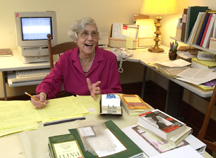 Purdue News
Purdue News
 Purdue News
Purdue News

|
|
May 2001 The American family circa 2020 –
|

|
"It is ironic that no responsible fledgling business would proceed without a written business plan, yet families are ad hoc, informal and taken for granted," Holtman says. "Families need to take time to think through what they really want to do.
"My hope is that in 2020, families will be much more sophisticated in making choices. A family needs to identify its dream. This demands an examined, conscious approach to what is going on around them."
Nothing has diminished Holtman's excitement about the family unit since she graduated from Purdue University in 1940 with a home economics degree. She describes herself as "still as excited about what can be done with families as when I received my degree."
The 82-year-old Holtman is no Pollyanna, though. The title of the family management program she put together with a Purdue home economics Ph.D. graduate in the 1970s was originally "Goals and Roles for the Outstanding Woman." It morphed into "Goals and Roles for the Overwhelmed Woman or How to Remain Sane and in the Game."
Holtman chuckles at the title. But after more than six decades dealing with family issues, she remains very serious about women's roles and the health of the family.
Holtman worked in business, academia and social work before she went into the childcare and family consulting business in West Lafayette, Ind., at age 62. She describes the unifying element of her career as "teaching vocational home economics – action-oriented, hands-on, family management consulting.
"You can't change people. You have to start from where they are. People have to change themselves."
Holtman suggests putting into place – in writing – a family action plan of vision, mission and goals. There are resources in the mainstream educational system, "but education must extend beyond established systems to other resources, training programs and utilizing experts in everything from money matters to spirituality.
"People now are graduating from college with coursework that leads to jobs, not to being prepared with skills to start a marriage or to manage a family and children. The family is under unreal pressures now, but in some ways the family has always been on the brink."
Professor Shelley M. MacDermid, director of Purdue's Center for Families, says much of the current debate about the nature of families – and particularly that which sees the family as in crisis – references only the last 50 years.
"The family is very resilient," MacDermid says. "One hundred years ago as many marriages ended in death as they do now in divorce. Divorce rates in the United States stabilized 20 years ago, albeit at a high rate. Women have been entering the work force at a steadily increasing rate over the last century.
"The institution of the family is changing all the time in relation to the social environment around it. When I weigh the evidence, I come away more encouraged than discouraged."
Holtman takes a total systems approach to what she describes as management for the contemporary family. She also says that family management coursework should be a required part of every student's college curriculum.
"The family is a small system among a number of larger systems – government, education, employment, churches, social agencies," she says. "Each of the systems is hard to crack or to change, so you have to collaborate with each of the systems to have a successful family."
She advocates "intentional family training" because systems require systematic management. "In the last 30 years the systems have become more complex, so they demand more management.
"Managing is always management of change, and ultimately, as management skills grow, being able to anticipate change," she says. "Solving one problem makes you more able to solve the next problem.
"You can conceive of the family as a business enterprise– a system to produce human capital. You need the same skills to run a family as you do to be successful in a small business.
"A family is more than a business because there is no failure. You keep building on your skills for your whole life."
Sources: Mary Holtman, (765) 743-1533
Shelley M. MacDermid, (765) 494-6026, shelley@purdue.edu
Writer: J. Michael Lillich, (765) 494-2077, mlillich@purdue.edu
Purdue News Service: (765) 494-2096; purduenews@purdue.edu
PHOTO CAPTION:
Mary Holtman has been working with families since she graduated in home economics from Purdue University in 1940. She contends that families, like businesses, need a written plan and a thought out path to success. (Purdue News Service Photo by David Umberger)
 To the Purdue News and Photos Page
To the Purdue News and Photos Page